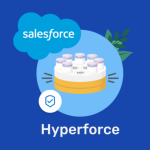Salesforce is a powerful Customer Relationship Management (CRM) tool, enabling companies to connect with their clients through cloud-based software. Here, you can have a complete overview of your business performance in operations, finance, sales, marketing, and more.
Salesforce has various products that are specially designed to deliver each goal: Sales Cloud, Revenue Cloud, Service Cloud, Marketing Cloud and Pardot, and so much more. With the proper implementation of this CRM, you will increase sales efficiency, close more deals, and increase the accuracy of forecasts.
What is Salesforce Used for?
Salesforce is a multi-solution platform that has been designed to help businesses manage their customer communications, records and sales data. It provides a digital facility for keeping track of all customer as well as client information.
This powerful all-in-one CRM has been able to solve business problems that had originally required multiple tools and software which were expensive as they each required dedicated teams and resources to manage them.
How do you implement Salesforce?
It is not enough to purchase the world’s best CRM license – that’s just the first step. The second, most important step is knowing how to adapt and customize it for your own business so you can get the most out of it.
For a complete implementation, you will need a project manager, a Salesforce consultant, and (maybe) Salesforce developers, but not all companies have the internal resources to do this – especially when they’re just getting started.
Here at Tech Talent Consulting we are certified Salesforce Partners and specialse in supporting businesses with Salesforce Implementation. Get rid of the stress of getting Salesforce implemented within your organization by opting for our end-to-end Salesforce implementation Services.
We know the importance of Salesforce implementation. At Tech Talent, we take over the complete responsibility of setting up Salesforce within your organization based on your specific requirements.
Let us walk you through the various options of implementing Salesforce now.
Option 1: Implement yourself (not recommended) 
If you are entirely new to Salesforce, we do not recommend doing this by yourself. While this option may seem tempting with the admin-friendly back-end interface that Salesforce offers, you run the risk of implementing a solution that may work for today, but is not done in a scalable way. Then, when your business grows, you have to rebuild existing functionality, which can result in other components not working… you see where we’re going with this. This is known as technical debt, and recovering or removing technical debt is a common request for “independent” implementers that finally seek out consultancies.
Here are 3 reasons why you should not handle your Salesforce Implementation yourself:
Slowed productivity: Depending on the skillset of the internal resources, handling a Salesforce implementation in-house will likely end up taking much longer than if an implementation partner were to do it. The research time alone on basic Salesforce components would take far too long without the guidance of a partner on where to look. The size of the team is also vital; letting a smaller team take care of the implementation could run up costs in the long term versus getting access to several Admins, Developers and Architects at a Salesforce Partner.
Underestimating Projects: More often than not, the focus can diverge when setting out the roadmap in Salesforce Implementations. The team may be keen to make use of Salesforce’s latest developments and products, but can sometimes leave data migration or integration as an afterthought. To hit a significant hurdle not correctly considered beforehand, can be costly nearing the end of the scheduled sprint. Integrations and data migrations often require an especially high level of experience, knowledge and practice.
Lack of Experience: While the team may boast some Salesforce experience and have some Salesforce certifications to show, do they possess implementation experience in your market or industry?
Option 2: Use a Salesforce Partner – the most popular and recommended option
Leveraging the knowledge and experience of a partner addresses a lot of the pitfalls associated with self-implementation. By getting instant access to several years of implementation experience, not to mention the internal network within the partner itself, you gain the ability to move not just quickly, but efficiently.
Benefits of using Tech Talent as your Salesforce Implementation Partner:
Consultation – Our Consultants meet you with a highly professional approach and discuss your goals and objectives in the initial meeting. Thereafter, a complete service strategy is launched to deliver optimal performance and favourable outcomes.
Configuration & Customisation – We offer solutions in two ways – configuration implies modifying Salesforce default features with point and-click tools. And customization allow deep tailoring of a platform with apex code when your business demands large-scale changes.
Implementation – During this process, our Salesforce Experts integrate your CRM system and streamline the operations in a very result-oriented configuration. Our team-work in great coordination to tailor a customized communication system for you.
Integration – We migrate your data into the new Salesforce solution without data loss or corruption. The legacy data is analyzed and structured before the migration so that the data remain ready to use as soon as it is migrated.
Data Migration – We migrate your data into the new Salesforce solution without data loss or corruption. The legacy data is analyzed and structured before the migration so that the data remain ready to use as soon as it is migrated.
User Training – After Salesforce Integration, we offer training to promote user adoption, so that your employee productivity increase and your business makes the most out of the installed system and the customized features.
Launch & Support – A custom Salesforce Solution is tested by QA engineers and then migrated to the User Acceptance Testing environment where the customer company approves of the solution’s functionality. Once accepted, the new Salesforce Solution is launched and supported.
We know that CRM software drives the tech suite of an entire business and can add tremendous value to the company. But improper preparation and misaligned objectives can halt your business from reaching the intended reach. We conceive a proper CRM implementation strategy that covers everything from Research and design to development and future.
Salesforce Implementation Process
A Salesforce Implementation typically follows the following structure:
– Define Stakeholders
– Define High-level Goals
– Gather Requirements
– Prioritize Requirements
– Build
– Testing and Implementation of Feedback
– Prepare for Go-Live (change management)
– Go-Live

Our Salesforce Integration Process
Once you approach for Salesforce implementation, our experts will have a detailed meeting with you about developing the implementation plan. Here, we will ascertain specific details such as:
⦁ Your marketing and sales objectives
⦁ Key organizational goals
⦁ Composition of customers/clients you want to cater to
⦁ Your budget allocation
⦁ The business processes you want to automate
⦁ The degree of automation you require
As your trusted Salesforce Consulting Partners, we will ensure that you are able to make the best use of the CRM platform according to your needs and get the best possible return on your investment. Right from initial planning to final execution, we will assist you in getting Salesforce implemented to obtain the best possible results out of the platform.
Our Salesforce implementation services include complete assistance in performing each of the functions discussed hereafter with utmost transparency and sticking to your core business requirements.
Creating a Project Timeline
The Salesforce experts at TechTalent believe in taking the strategic and productive route to get Salesforce implemented within your organization. We will start by helping you create a complete project timeline for Salesforce implementation.
Always make sure that you are ready to devote a good amount of time to set up the CRM platform in your company. We will ensure that the project timeline does not overlap with any other important project going on within your organization.
Also, we ensure that the manpower we need for the implementation is available during the course of the timeline.
Once all the resources to be allocated are defined, our experts will provide you with a detailed project timeline with the following key milestones:
⦁ Alpha
⦁ Beta
⦁ Pilot Testing
⦁ Kick off
⦁ Business Process Mapping
We will add these and all other relevant events and milestones to be achieved over a specific period of time. Before starting with your Salesforce implementation process, you can rest assured that you will be thorough with the manner in which it will finally be launched in your organization.
All the activities hereafter will be conducted according to the project timeline.
Defining Goals & Metrics
Once the project timeline is created, we will help you in defining all the important goals and metrics that would help you get a clear direction in which we will be heading.
Here, the major objectives discussed with you will play an important role. We will quantify the goals you want to attain to make it easier for you to measure your ROI once Salesforce implementation is carried out.
Our team helps you define all relevant key performance indicators (KPIs) that you want to focus on, helping you focus on the takeaways you are expecting once Salesforce is implemented.
Although different businesses have different requirements and priorities, here are some of the most common KPIs our clients want to focus on:
⦁ Follow-up contact rate
⦁ Lead response time
⦁ Average contract value
⦁ Average sales cycle length
⦁ Contract rate of outbound calls
⦁ Number of outbound calls
⦁ Lead conversion rate
⦁ Sales activity (revenue generated)
⦁ Number of demos
⦁ Lead-to-opportunity ratio
⦁ Opportunity-to-win ratio
⦁ Amount of inbound leads
Start your Transformation Journey
As your trusted Salesforce Consulting Partners, we will ensure that you are able to make the best use of the CRM platform according to your needs and get the best possible return on your investment.
Right from initial planning to final execution, we will assist you in getting Salesforce implemented to obtain the best possible results out of the platform.
If you want to learn more about Salesforce Integration or looking to transform your business, get in touch with us today for a free consultation.

If you enjoyed this article please share this article on your LinkedIn.
FAQS
Salesforce Implementation: What is it?
The process of setting up, modifying, and implementing Salesforce CRM to meet your company’s requirements is known as Salesforce implementation. Data migration, user education, and tool integration are all included.
How much time does it take to implement Salesforce?
The size and complexity of your company will determine how long it takes to adopt Salesforce. It usually takes two to six months, depending on the requirements for integration and customisation.
Why is data migration crucial to the implementation of Salesforce?
Data migration guarantees the safe transfer of your historical data from legacy systems to Salesforce, enabling analysis and decision-making. Accuracy and data loss are avoided with proper migration.
Is it possible to combine Salesforce with other business tools?
Indeed, Salesforce has strong integration features. To guarantee a smooth data transfer across systems, it can be integrated with a number of third-party apps, including email tools, accounting software, and marketing platforms.
How can I make sure my Salesforce implementation is successful?
Clear goal-setting, active stakeholder participation, effective project management, and the appropriate knowledge are all necessary for a successful implementation. Your project can remain on course if you collaborate with knowledgeable partners like TTC Group.









